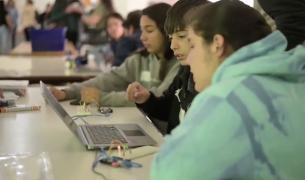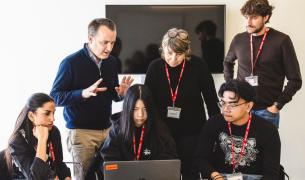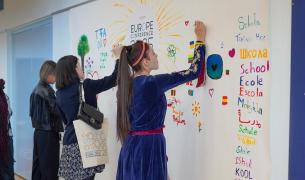Teach For All Hosts an Intergenerational Discussion on World Youth Skills Day
Teach For All believes all children and young people deserve the education, support, and opportunity to fulfill their potential and attain meaningful careers through which they can shape a better future for all. Through our work and partnerships, we aim to provide students with access to the knowledge, training, resources, support, and mentors that will help them to make informed decisions about their future. To celebrate this year's World Youth Skills Day, Teach For All hosted an intergenerational discussion with student leaders from Teach For Armenia, Enseña por Colombia, Teach For India, Teach For Lebanon, Enseña por México, Teach for the Philippines, and Teach For Ukraine, as well as representatives of our corporate partners, the Deutsche Post DHL Group and Citi—both of which are deeply committed to generating employability opportunities for youth. Together, adults and students envisioned what a system that allows youth to thrive in and contribute to a changing world could look like, and how to create this ideal system.
The following are some of the insights that emerged from this rich discussion:
A broad range of experiences will enable informed decisions
Isha Thakur, an 18-year-old student from India, shared how she discovered a disconnect between school and the larger world when she finished her studies and applied to jobs and internships, still lacking basic entry-level skills. She realized how important it is to connect with adults, teachers, or other role models who can share their personal and professional journeys to guide students in this important transition. Other students highlighted the need to build bridges between corporations and young people to challenge the disconnect that exists when they complete their education. "I think schools should introduce students to the diversity of possible directions and real-life experiences, especially by teaching them soft skills and communication,” shared Liza Shelestova, a student from Ukraine.
Youth-adult partnerships require equal representation and value
To create a meaningful partnership, ideas both from adults and students should hold the same value. The students shared the need to stop categorizing ideas based on who expressed them and acknowledge that we will make little progress without joint forces. This vision comes to life when adults and young people can establish equitable partnerships and are both recognized for their unique roles, perspectives, and impact in this work. Christoph Selig, Vice President Sustainability Communications and Programs, Deutsche Post DHL Group, encouraged the creation of more spaces like this conversation. "There are many people out there who are willing to sit down [with young people] to engage, to listen, to support and do whatever is necessary," he said.
Students should develop employability skills early on
The students shared that while they might be learning from textbooks, they aren’t gaining the set of transferable skills that will enable them to successfully adapt to the workplace. Tatiana, a student from Colombia, described how after graduating from school at 16, she had to attend a series of programs to gain the skills she was missing to enter the workforce. The students explained that they know there is more they could be learning in the classroom and expressed their desire to attain real world skills, in areas such as communication and financial literacy, and access to the technology they will be expected to use once they are employed. They shared that while some high schools may begin to develop these skills, students are ready for and in need of much earlier exposure.
Success depends on a value-driven approach to growth and development
Students should develop the values that will prepare them to take on roles that will have a positive impact on society. Raghvendra Yadav, a 17-year-old student from India, shared how succeeding professionally without values is not enough. "We need to hold some strong values…so that everyone grows and is relatable to each other,” he said, highlighting how values help create equal and inclusive work environments. In addition, developing key social and emotional competencies will support students throughout their careers and help them manage the pressure and uncertainty of work life. “It is important [to develop] emotional intelligence, and everything related to soft skills and leadership,” Maria Alejandra Casterge from Citigroup emphasized.
Teach For All is reinforcing its commitment to empowering students with the skills and experiences they will need to be ready for career opportunities and to help shape the future of their communities. Learn more about the efforts of Teach For All's corporate partnerships to expose young people across the network to the world of work.


